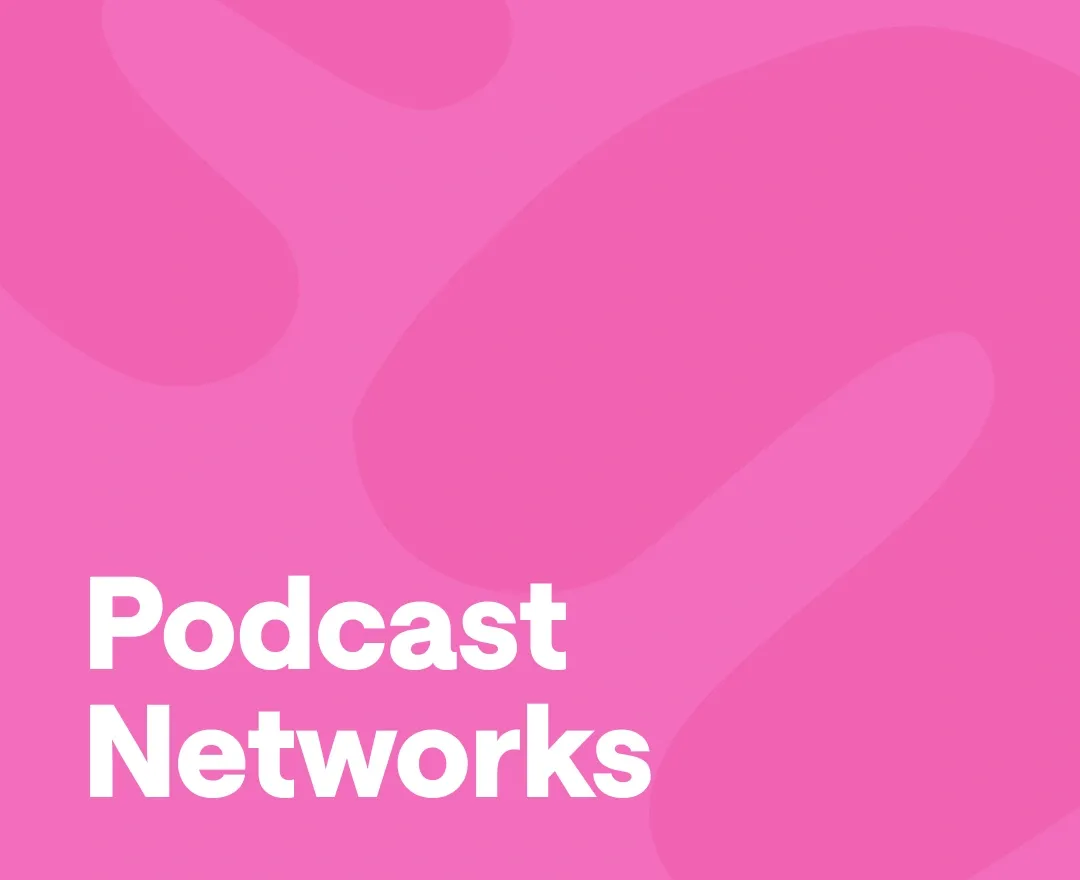Whether you're a budding podcaster or a seasoned voice in the industry, the collaborative power of podcast networks can propel your success. Similar to the role of music labels in the music industry, these podcast networks provide essential support and resources to enhance your reach and engage a broader audience. Just as musicians find relief from much of the grind of self-promotion when signing with a label, podcasters benefit from the collective assistance these networks offer. In return for this support, artists willingly share their profits, recognizing that the earned revenue is a direct outcome of the collaborative endeavor.
While podcast networks share similarities with music labels, they also operate with unique distinctions. Unlike music labels, podcast networks typically don't dictate creative control or own the rights to your content. Instead, they serve as partners, providing valuable services in exchange for a share of the revenue.
To help you decide whether aligning with a podcast network aligns with your podcasting goals, let's explore the intricacies of these networks and the potential benefits they offer.
What is a Podcast Network?
Essentially, a podcast network can be defined as a carefully curated assembly of interconnected podcasts strategically brought together under a common overarching structure. Imagine it as a digital conglomerate, where individual shows maintain their independence while simultaneously reaping the benefits of the collective strength that the network provides. Acting as a central distribution hub, the network significantly enhances the reach and impact of each podcast within its domain.
How Do Podcast Networks Work?
These networks function as efficient facilitators, streamlining various facets of podcast production, distribution, and monetization. The intricate web of collaboration within these networks involves the pooling of shared resources, cross-promotional efforts, and the implementation of a cohesive branding strategy. Essentially, Podcast Networks establish a well-organized framework that enables podcasts to thrive collectively, creating an environment where the achievement of one podcast contributes to the overall success of the entire network. This structured approach fosters an atmosphere conducive to collective success and growth.
Who Can Join a Podcast Network?
Podcast networks have varying requirements for accepting new shows into their stable. However, some of the most common factors considered include:
1) Minimum Download Numbers: Networks often set minimum download numbers for potential podcasts to join, ensuring a certain level of audience engagement and popularity. These numbers can range from 1,000 downloads per episode to 5,000 downloads per month, depending on the network's size and prestige.
2) Consistent Publishing Schedule: Networks seek podcasts that maintain a consistent publishing schedule, demonstrating a commitment to regular content creation and audience retention. This could mean releasing new episodes weekly, bi-weekly, or monthly, depending on the network's guidelines and expectations.
3) Production Quality: Networks value podcasts that adhere to high standards of production quality, ensuring a polished and professional listening experience. This encompasses aspects like clear audio, engaging storytelling, and effective editing.
4) Genre Alignment: Networks often focus on specific genres or temáticas, and they seek podcasts that align with their overall brand and audience preferences. This ensures that the new podcast complements the existing network's offerings and appeals to the established listener base.
5) Audience Engagement: Networks are interested in podcasts that demonstrate strong audience engagement, as evidenced by positive reviews, social media interactions, and listener feedback. This indicates that the podcast has the potential to attract new listeners and contribute to the network's overall success.
6) Uniqueness and Innovation: Networks seek podcasts that offer unique perspectives, fresh ideas, and innovative approaches to their chosen genre. This helps the network stand out from competitors and attract listeners who are seeking distinctive and engaging content.
7) Long-Term Growth Potential: Networks evaluate the podcast's potential for long-term growth and sustainability, considering factors like the show's concept, creator's experience, and overall market trends. This ensures that the network invests in podcasts with a promising future.
8) Alignment with Network Values: Networks often have their own set of values and principles that guide their operations and content choices. They seek podcasts that align with these values, ensuring a cohesive and consistent brand identity.
9) Cross-Promotional Potential: Networks assess the potential for cross-promotion between the new podcast and existing shows within the network. This could involve co-hosting episodes, guest appearances, or cross-promotion on social media and other platforms.
10) Monetization Potential: Networks may consider the monetization potential of the podcast, evaluating its ability to generate revenue through advertising, sponsorships, or merchandise sales. This is particularly important for networks that focus on monetization as a key aspect of their business model.
How to Join a Podcast Network
Joining a podcast network involves a symbiotic evaluation: network administrators will want to assess the quality, consistency, and thematic compatibility of your podcast, while you will want to gauge the network's reputation, audience demographics, and the value it adds to your podcasting journey. Once both parties find resonance, the integration process begins.
While the process will vary depending on the specific network and its requirements, here's a general overview of the steps involved:
1) Research and Identify Potential Podcast Networks: You should begin by researching podcast networks that align with your podcast's genre, audience, and overall goals. Consider factors like network size, reputation, audience reach, and distribution channels, and then review your chosen network's submission guidelines and requirements carefully.
2) Prepare Your Podcast's Media Kit: Create a comprehensive media kit that highlights your podcast's strengths and achievements. Include key information like podcast statistics (downloads, engagement metrics), listener demographics, and critical acclaim, and be sure to showcase your podcast's unique selling points, such as awards, special guests, or innovative storytelling techniques.
3) Reach Out to the Network and Express Interest: Contact the network's submission or acquisition team through their designated channels, which will usually be email or an online form. Craft a compelling pitch email that introduces your podcast, highlights its strengths, and explains why it would be a valuable addition to the network. Don’t forget to express your understanding of the network's requirements and demonstrate your commitment to aligning with their brand.
4) Submit Your Podcast for Review: Provide the network with access to your podcast's audio files–typically through a secure online platform–along with any additional materials requested by the network, such as transcripts, social media links, or promotional materials.
5) Participate in Network Interviews and Assessments: If selected for further consideration, you may be invited to participate in interviews or assessments with network representatives. Be prepared to discuss your podcast's goals, audience engagement strategies, and plans for future growth. Demonstrate your passion for your podcast and your willingness to collaborate with the network.
Pros of Joining a Podcast Network
Amplified Reach
Pooling resources translates to broader visibility. Joining a podcast network opens doors to a larger audience base, exposing your content to listeners who might otherwise remain undiscovered.
Collaborative Opportunities
Networks foster collaboration among podcasts, leading to cross-promotional activities, shared audiences, and potential guest appearances. These synergies create a rich tapestry of content interconnectivity.
Monetization Strategies
Leveraging the network's collective strength, podcasters can explore more robust monetization avenues. Advertisers are often drawn to networks due to the cumulative reach of their podcasts.
Cons of Joining a Podcast Network
Loss of Full Autonomy
While collaboration is a strength, it comes at the cost of some autonomy. Podcasters may need to align their content with the network's overarching theme, potentially limiting creative freedom.
Revenue Sharing Dynamics
While networks facilitate monetization, they often retain a percentage of the revenue generated by affiliated podcasts. Podcasters need to weigh this against the benefits gained from network support.
Top 10 Podcast Networks
1) Gimlet Media
Founded in 2014 and acquired by Spotify in 2019, Gimlet stands out for its award-winning audio journalism and entertainment that aims to foster human connection and understanding.
2) Wondery
Wondery is a premium podcast network known for high-quality content across various genres, but especially true crime, history, and business. It distinguishes itself with exclusive series, early access, and ad-free listening options.
3) Earwolf
Earwolf is a comedy podcast network celebrated for its array of popular shows like Comedy Bang! Bang!, Office Ladies, and How Did This Get Made?. Its unique appeal lies in its dedication to comedy, hosting a variety of comedic talents and providing a platform for both established and emerging comedians
4) Radiotopia
Radiotopia is a podcast network that empowers independent creators to produce well-crafted, innovative audio content. It is known for its commitment to bold authenticity and boundless creativity, offering a community for award-winning podcasts with a vision
5) Maximum Fun
Maximum Fun is an artist-owned cooperative podcast network that focuses on comedy and culture. It stands out for its independent production, community-driven content, and its unique status as a 100% worker-owned cooperative since June 30, 2023.
6) Multitude
Multitude is a podcast company that produces and supports independently created shows with a focus on building community-driven content. It is known for its commitment to empowering creators through education and resource sharing, as well as fostering a space where passionate people can create shows that resonate with diverse audiences.
7) Parcast Network
Parcast Network is a digital media firm and podcast network that specializes in producing scripted podcasts and audio dramas across genres like mystery, crime, science fiction, and history. It was acquired by Spotify in 2019, making it part of one of the largest podcasting platform mergers in US history.
8) PodcastOne
PodcastOne is known for its “pure play” in podcasting–dedicating itself solely to producing and distributing shows without diversifying into content licensing or merchandise production.
9) Panoply
Panoply.fm is a premium podcast network that curates a diverse range of high-quality podcasts, with a focus on storytelling, history, and self-help genres. It offers production, marketing, and audience development services to help create engaging and informative audio content.
10) Cadence13
Cadence13 is a podcast network known for producing high-quality documentary-style content, with a focus on in-depth storytelling on topics like the 2019 college admissions bribery scandal and the National Rifle Association.
Podcast Networks FAQ
What's the typical revenue-sharing model in podcast networks?
Revenue-sharing models vary, but common structures involve networks taking a percentage of ad revenue, typically ranging from 10% to 40%.
Can I leave a podcast network once I join?
Yes, many podcast networks allow podcasters to exit the network, usually following a predetermined notice period.
Do I retain ownership of my content when affiliated with a network?
Ownership terms vary but are often retained by the individual podcasters. However, licensing agreements may apply.








